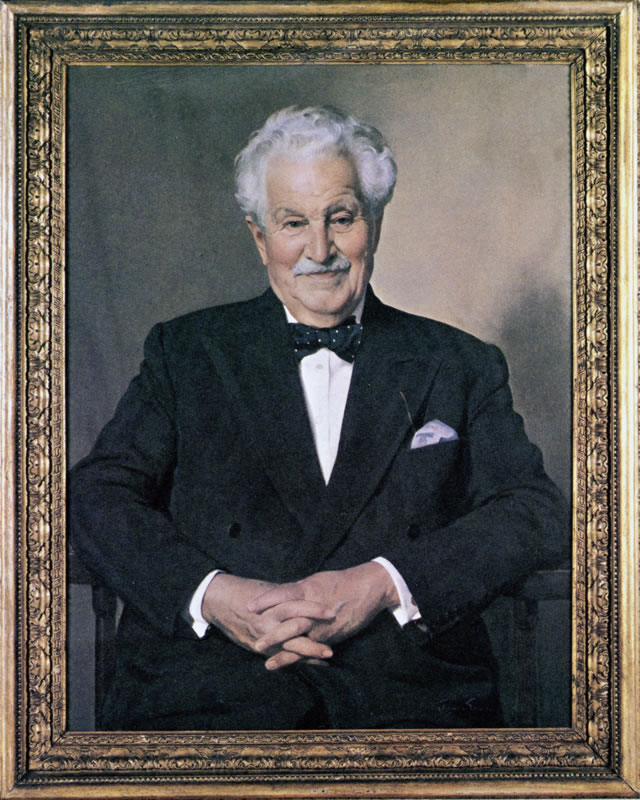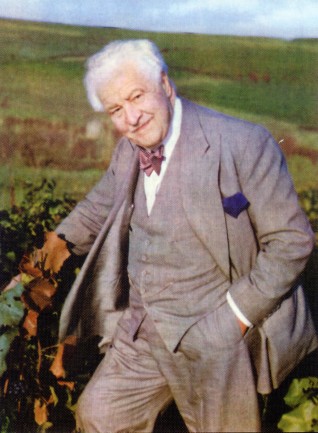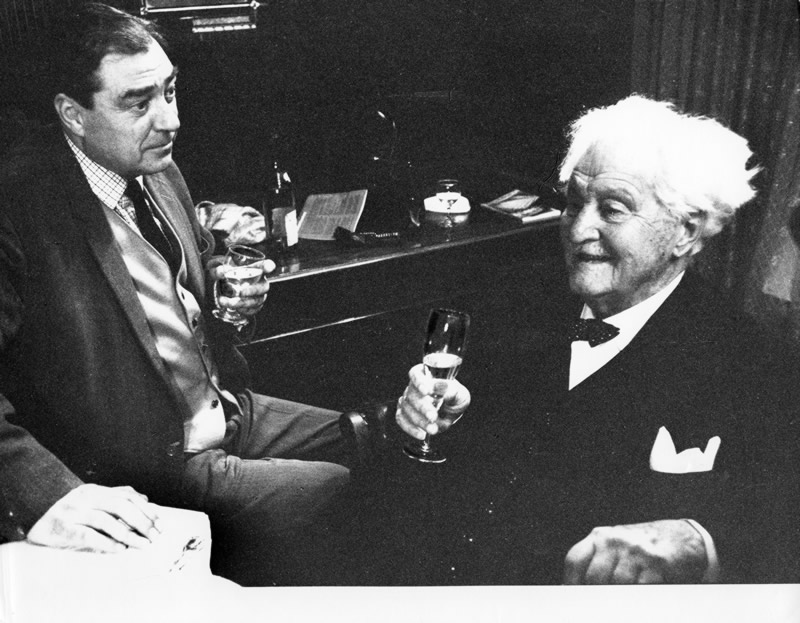History
 Founder André Simon created the International Wine & Food Society in 1933 with a simple goal:
Founder André Simon created the International Wine & Food Society in 1933 with a simple goal:
"The object of the Society is to bring together and serve all who believe that a right understanding of good food and wine is an essential part of personal contentment and health and that an intelligent approach to the pleasures and problems of the table offers far greater rewards than the mere satisfaction of appetite". Watch a video about the society.
The Beginning
The Wine and Food Society, later the International Wine & Food Society, was founded in London, England, by André Simon in 1933. At that time, the Society was the world's only association of gastronomic enthusiasts not associated commercially with the wine and food trade. Today, there are hundreds of organizations that fit this category, but the International Wine & Food Society remains the most prestigious, most widespread, independent gastronomic society in the world.
The very thought of a society for wine and food was, in the early 1930s, a bold idea. That period was not a propitious time in which to start an international association of gastronomes. Nazi Propaganda Minister Goering spoke of "guns before butter", children were being told that nasty tasting food was good for them, and anything that smacked of extravagance was distinctly unfashionable.
The Wine and Food Society, later the International Wine & Food Society, was founded in London, England, by André Simon in 1933. He set the official date as October 20, and plans for the first event were made over dinner at the home of The Dowager Lady Swaythling in Kensington Court on October 31. In attendance with André and his wife was AJA Symons, the Society's cofounder and first Secretary. In January 1934, a Society banquet for nearly 400 people was held at the Savoy in London, launching from a small nucleus an international organization which burgeoned to proportions that even André initially could not have imagined.
 At that time, the Society was the world's only association of gastronomic enthusiasts not associated commercially with the wine and food trade. Today, there are hundreds of organizations that fit this category, but the International Wine & Food Society remains the most prestigious, most widespread, independent gastronomic society in the world.
At that time, the Society was the world's only association of gastronomic enthusiasts not associated commercially with the wine and food trade. Today, there are hundreds of organizations that fit this category, but the International Wine & Food Society remains the most prestigious, most widespread, independent gastronomic society in the world.
The very thought of a society for wine and food was, in the early 1930s, a bold idea indeed. That period was not a propitious time in which to start an international association of gastronomes. Nazi Propaganda Minister Goering spoke of "guns before butter", children were being told that nasty tasting food was good for them, and anything that smacked of extravagance was distinctly unfashionable.
André rose to the occasion. Although some considered him an eccentric, he espoused a philosophy that worked during that era of austerity and has continued to appeal since. He urged high culinary standards while deploring waste, declaring it criminal to ruin valuable foodstuffs by bad preparation. He believed that quality could and should be maintained while adjusting to restraints impose by the economic circumstances of the day - with dispensation, of course, for the occasional special feast.
His position was always one of moderation and simplification. Although he was brought up in a period of long, elaborate meals, he eschewed the proliferation of complex dishes, preferring a restrained sequence of wines to accompany a limited number of courses. He took his aperitifs (champagne if at all possible) without hors d'oeuvres. A proper dinner, he insisted, should begin with soup, and the fish to follow required only the most basic preparation. He served lesser wines at the beginning and reserved the mature, noble ones for the main course and the cheese. He enjoyed sauternes with dessert, and cognac - or more often port - afterward. He was able to adapt to simpler fare with facility, indeed with approval, and it was always quality, not quantity, that mattered.
While his philosophical outlook made him well suited to the times, it was surely the sheer power of his personality that forged and sustained the Society in those early years. His skilled diction, his witty conversation and his entertaining stories, all delivered with a disarmingly engaging French accent, opened doors for him; his knowledge and dedication gained him the respect that kept the doors open wide.
 In 1934, André traveled to the United States where he founded a branch in Boston and subsequently a Chicago branch on December 17. On January 9, 1935, he founded a San Francisco branch, then a Los Angeles branch on January 22 and a New Orleans branch on February 9. His first attempt to start a New York branch proved unsuccessful, but it was soon afterwards re-founded under the chairmanship of Henry W. Taft, brother of the former US President.
In 1934, André traveled to the United States where he founded a branch in Boston and subsequently a Chicago branch on December 17. On January 9, 1935, he founded a San Francisco branch, then a Los Angeles branch on January 22 and a New Orleans branch on February 9. His first attempt to start a New York branch proved unsuccessful, but it was soon afterwards re-founded under the chairmanship of Henry W. Taft, brother of the former US President.
There was much he enjoyed about the United States, but he disapproved the Americans' affinity for iced water and hard spirits. Wine, he insisted, was a natural beverage. Dry martinis were not. (All the branches he founded on his first visit are healthy and vigorous today. Los Angeles changed its name to Southern California some years ago and a new Los Angeles branch was initiated in 1996.)
There followed journeys to Australia and South Africa that endowed the Society with a healthy and vigorous worldwide representation. The network grew slowly under the direction of the Founder with great help from his close friend, AJA Symons, who died at the early age of 41. Thereafter, the Society was the child of André's efforts alone. The Society's Journal, Wine and Food, which he founded and edited, was what kept the organization together during the war. By 1947, there were about 1,500 members worldwide.